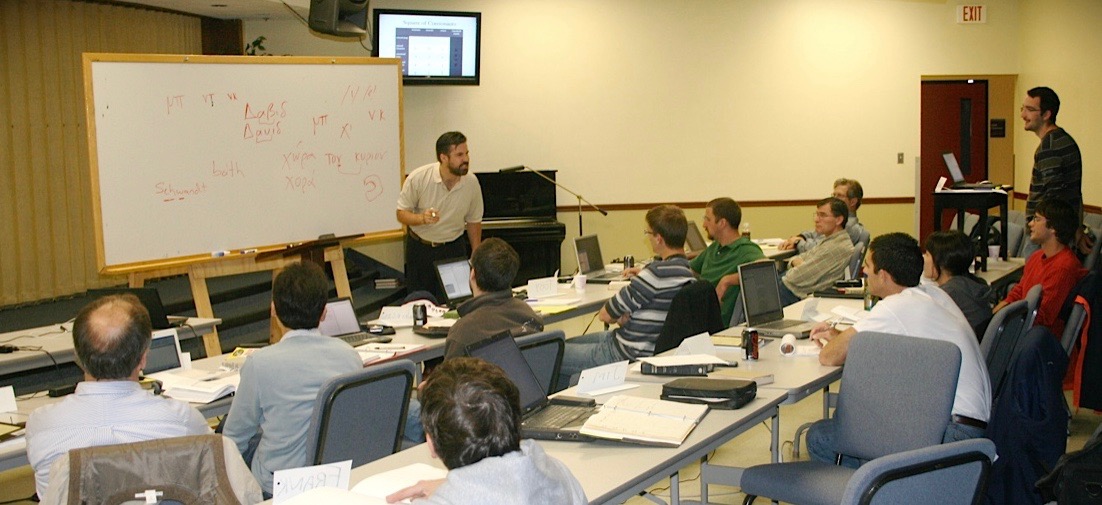Deacons
We hold to the following doctrines
We believe that God appoints some Christians to serve as recognized servants of the church, called deacons. They are not a second tier of leaders, exercising authority of their own, but spiritual Christians called by God to help free the elders from certain duties that the elders might have adequate time for prayer and the ministry of the Word (Acts 6:1-7). Scripture lists the qualifications of a deacon in 1 Timothy 3:8-13. Deacons serve in various ministries, such as distributing food to the needy of the church (Acts 6:1-6).
We apply these doctrines as follows
Work of Deacons
Deacons are formally recognized servants of the church. They are to be spiritual Christians, such as Stephen and Philip, not simply skilled accountants or practical workers. They must serve with God’s strength, wisdom, and grace. Those who “have served well as deacons obtain for themselves a high standing and great confidence in the faith that is in Christ Jesus” (1 Timothy 3:13). The saints should recognize their status as those ministering in the church and willingly serve alongside them.
Deacons, however, are not a governing board. They serve the church in submission to the elders. They are to follow the direction of the elders with regard to the use of funds.
Christians differ on whether the office of deacon is open to women. Those who approve of deaconesses say the qualifications make mention of women deacons: “Women must likewise be dignified, not malicious gossips, but temperate, faithful in all things” (1 Timothy 3:11). They point to Phoebe as an example, whom Paul describes as “a servant [deaconess] of the church which is at Cenchrea” (Romans 16:1). Those who disapprove of women serving as deacons point out that the word translated “women” in 1 Timothy 3:11 can be translated “wives.” They say the verse refers to the qualifications of the wives of the deacons, not to deaconesses. Phoebe, they say, was a servant of the church, but not in the formal sense of a recognized deacon. As in other matters where Christians differ in their interpretation of Scripture, the elders must decide what the position of the church will be.
Finances
Deacons usually manage the church’s finances. In doing so they should adopt the same accounting practices and standards used by professional accountants in their area, being careful to avoid false accusations or actual loss of church funds. They should report regularly to the elders and the saints as to the financial status of the church.
Often churches find it best to take the offering following the Lord’s Supper when mostly believers are present, rather than at more public meetings where visitors might misunderstand our motives. Elders and deacons should guard against the church becoming a place of constant fund raising and the solicitation of funds. Rather they should teach the saints their biblical responsibility to give to the work of the Lord through the church. The Old Testament required a Jew living under the Law to give ten percent of his income to the Lord; this is commonly called tithing. The command to tithe is not in keeping with the covenant of grace. Under the New Covenant we are told of a Savior who has given His all for us. God then waits to see what we will give in response.
The Church Facility
Deacons usually care for the building where the church meets. It should reflect well upon the faith and commitment to the Lord of the Christians who assemble there The building should be clean and in good repair, comparable to other quality meeting places in the community. It should provide for the needs of the elderly and disabled. The style and décor should be modern in style, fresh, and attractive, communicating life and vision for the future.
Though some mistakenly think of the church as a building with cross and steeple, the church of the New Testament has no walls. It is the people of God, the body of Christ. Christians don’t go to church; they are the church. The place in which they meet—whether a home, rented quarters, or a building specifically designed for that purpose—is of secondary importance. It is far less important than the spiritual condition of the people who meet there. Christians should, therefore, be content with what God provides and not spend great sums of the Lord’s money or commit themselves to large debts so as to build impressive structures.



